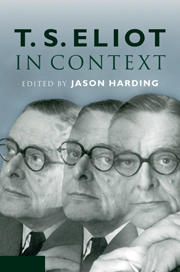Book contents
- Frontmatter
- Contents
- List of illustrations
- List of contributors
- Acknowledgements
- List of abbreviations
- Introduction
- PART ONE LIFE
- PART TWO FORMS
- 7 The role of intellectual
- 8 Publishing
- 9 Censorship
- 10 Literary journalism
- 11 Visual art
- 12 Dance
- 13 Drama
- 14 Music
- 15 Radio
- PART THREE LITERARY CROSS-CURRENTS
- PART FOUR POLITICS, SOCIETY AND CULTURE
- PART FIVE RECEPTION
- Further reading
- Index
8 - Publishing
Published online by Cambridge University Press: 05 August 2012
- Frontmatter
- Contents
- List of illustrations
- List of contributors
- Acknowledgements
- List of abbreviations
- Introduction
- PART ONE LIFE
- PART TWO FORMS
- 7 The role of intellectual
- 8 Publishing
- 9 Censorship
- 10 Literary journalism
- 11 Visual art
- 12 Dance
- 13 Drama
- 14 Music
- 15 Radio
- PART THREE LITERARY CROSS-CURRENTS
- PART FOUR POLITICS, SOCIETY AND CULTURE
- PART FIVE RECEPTION
- Further reading
- Index
Summary
Frank Morley once claimed that T. S. Eliot was appointed to the board of directors at the publishers Faber & Gwyer as a sound businessman; he was a banker who had worked for eight years in the City of London. Morley was exaggerating, but he correctly suggests that Eliot's literary reputation was not in itself sufficient to persuade the board to employ him in the autumn of 1925. Eliot himself recounted that his name had been passed to Geoffrey Faber as a literary adviser during a dinner at All Souls College, Oxford, by his friend, the journalist and man of letters Charles Whibley. Faber had recently joined Lady Gwyer's Scientific Press, a publishing house specialising in medical textbooks and periodicals (most notably, The Nursing Mirror) and he was planning to reorganise the firm as a general publisher. Eliot recalled a nervous interview in the spring of 1925, when he successfully convinced Faber of his usefulness to the new venture. It meant release from his work in a basement office at Lloyds Bank and Eliot described it as the best piece of salesmanship he had ever undertaken. Faber in turn persuaded any sceptical colleagues that Eliot's editorship of the highbrow quarterly review the Criterion would bring the firm prestige as well as extensive connections among British, American and European writers and intellectuals.
Information
- Type
- Chapter
- Information
- T. S. Eliot in Context , pp. 73 - 82Publisher: Cambridge University PressPrint publication year: 2011
